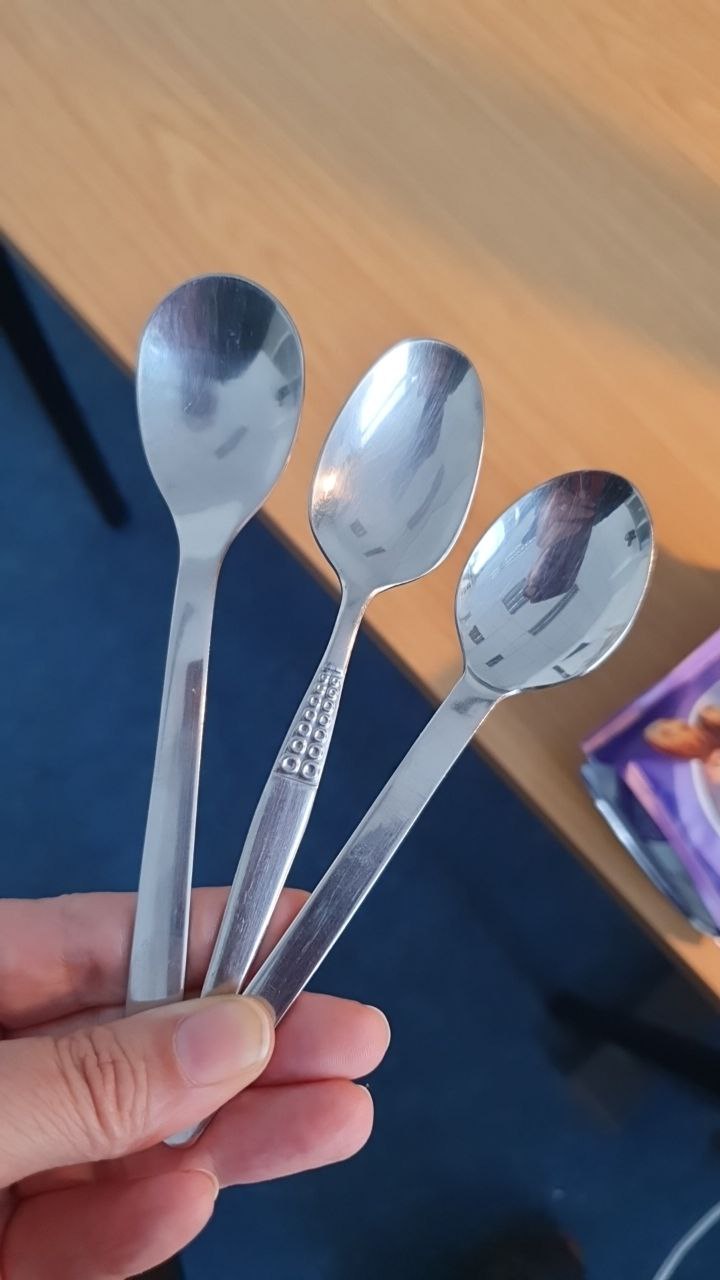I’ve always loved flashlights. Yes FLASHLIGHTS with an A!!! Anyway, apparently not many people share my rather niche interest.
So I ask you, fellow Lemmites, what are your hobbies and weird obsessions that you can ramble on about for hours?
Please feel free to ramble on about your passions here. Maybe you’ll find some likeminded individuals!
Falconry. It’s really more of a lifestyle than a hobby now though. I’ve been doing it for a little over 10 years now and am currently flying a cast (group of birds flown together) of 3 Harris’s Hawks.
Quick faqs:
- I use the glove and everything
- It’s a hunting sport, we catch rabbits 3-5 times a week
- We all go out together, I flush they catch
- No, they do not bring what they catch back to me, I go to them
- They don’t eat the whole rabbit, I trade them a small reward
- They are completely free flighted when doing this
- I’ve trained them just enough to get them back and work with me, they know how to do bird things naturally
- They don’t really go for your eyes, and getting bit hurts 50x less than getting footed
- They are not rescues and are perfectly healthy
- Mine are captive bred, but some are wild trapped
- Wild trapping has 0 effect on native populations, 50-90% of raptors don’t make it through their first year
- Even though mine are captive bred they are still wild animals, they are just tamed.
- This is the most regulated sport in the US
Birbs:
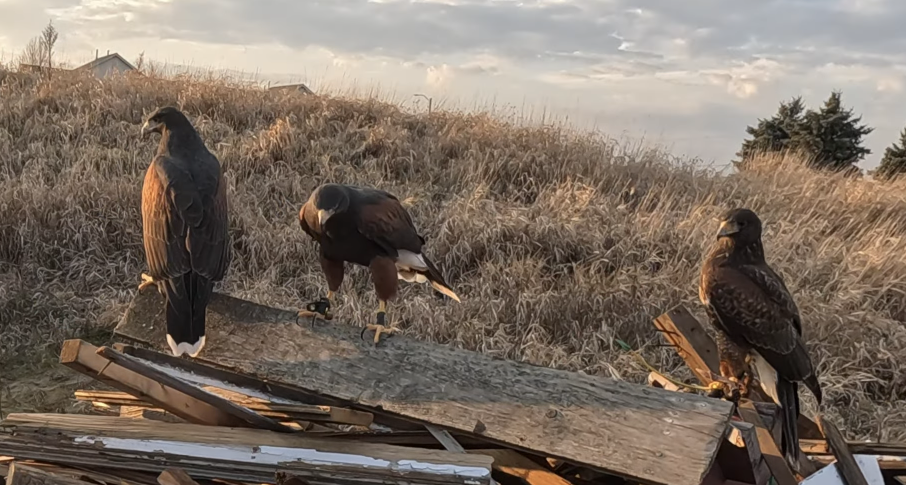
Look at dose birbs!!
Do you like owls? How smart are the birds? Are they as smart as a talking raven?
I like owls but they are not used for Falconry because they have poor lateral thinking (Owl knows how to jump to the glove inside, take them outside owl knows nothing) and because we have to follow all hunting laws (can’t hunt after dark). But for people who can hunt after dark, using an owl sucks because it’s dark and you can’t see anything that happens. Most falconers just love to watch their birds fly and it’s hard to see them fly in the dark!
Harris’s hawks are one of the smartest hawk species but I’m sure ravens are smarter. I think they’ve gotten HHs to use a simple tool but they are not as proficient as ravens. But in my observations it only takes one single bad experience for most raptors to never want that experience to happen again. And on the flip side, if they get rewarded doing something once they will remember that for a long time
Owls sound a bit dumb. Though they’re still cute. I plan on training a local starling population to fetch me money and attack my enemies. I’m training them with Gregg’s. They’re already taking food from my hands.
You may like c/superbowl
Thanks for paying the bird tax!
Who owns the birds? Are you tired of eating rabbit? It’s a really cool hobby!
Technically the US government owns the birds, but two of these are mine and one is my wife’s who is also a licensed falconer. We purchased them from licensed breeders. They are from, left to right, Nevada, Washington, Louisiana. They were shipped to us on an airplane and we picked them up at the airport.
Most of the rabbit goes back into feeding them over the summer when they are molting their feathers. I do make 2-3 rabbit dishes a year though. Last year I made sausage which was pretty good.
Does the government own ALL raptors, or are yours part of something like an airport bird removal project?
Idk if own is the correct term but the US regulates most native birds through the Migratory Bird Treaty Act and Falconry has a special exclusion from that act. But it’s along the same lines as just because a deer is in your yard it doesn’t mean you own that deer. You need permission from the government to take it.
Looked into this for a hobby. Was amazed at how well regulated it is and such a big commitment.
Amazing!!!
- Packing: backpacks, bags, organizers, compression sacks, all kinds of things like this. People loathe packing while I just love to play Tetris with my perfectly organized stuff. I have too many bags.
- Role-playing games: it is weird because I mostly collect them since there’s no time to play (nor to learn new rules).
- Automation: why spend 2 minutes manually something when I can spend 2 hours failing to automate it?
Oh man do I feel that roleplaying one. That was me for like 8 years until I got a new play group again. We don’t meet as often as any of us would like but when we do meet up that’s when the shenanigans start. Now I could gush for hours about various DnD stories I’ve gotten with this group
Also the automation one is great too, I spent 2 hours setting up a spreadsheet that tracks my finances (mostly) automatically. It will even tally up totals for the whole year. It’s great.
Hah yes. Packing.
We were allowed one trunk to take to school. Regardless of weight, you could take whatever you could fit in the trunk.
Needless to say, that when a family member complains they can’t fit any more into their bag, generally I’ll be able to repack it with loads of space left.
I too, have too many bags. And I managed to get my camping base weight down to about 8kg. Am not rich enough (or mad enough) to go full ultralight. This is with creature comforts.
Role-playing games: it is weird because I mostly collect them since there’s no time to play (nor to learn new rules).
Im the same, I love a good universe. Im not so enthralled with the game or the system, but the worlds they are in get me every time.
Yep. Frigging White Wolf sourcebooks are the worst for me. I’ll just read the whole thing as if it were a standard fiction book. The entire setting just gnaws at my mind. I wish there were long forms of the little blurbs you get in them.
So are you like just reading about the lore around it?
vacuums, why would I spend 100€ on a shopvac when I could do it myself for 200€ or even more?
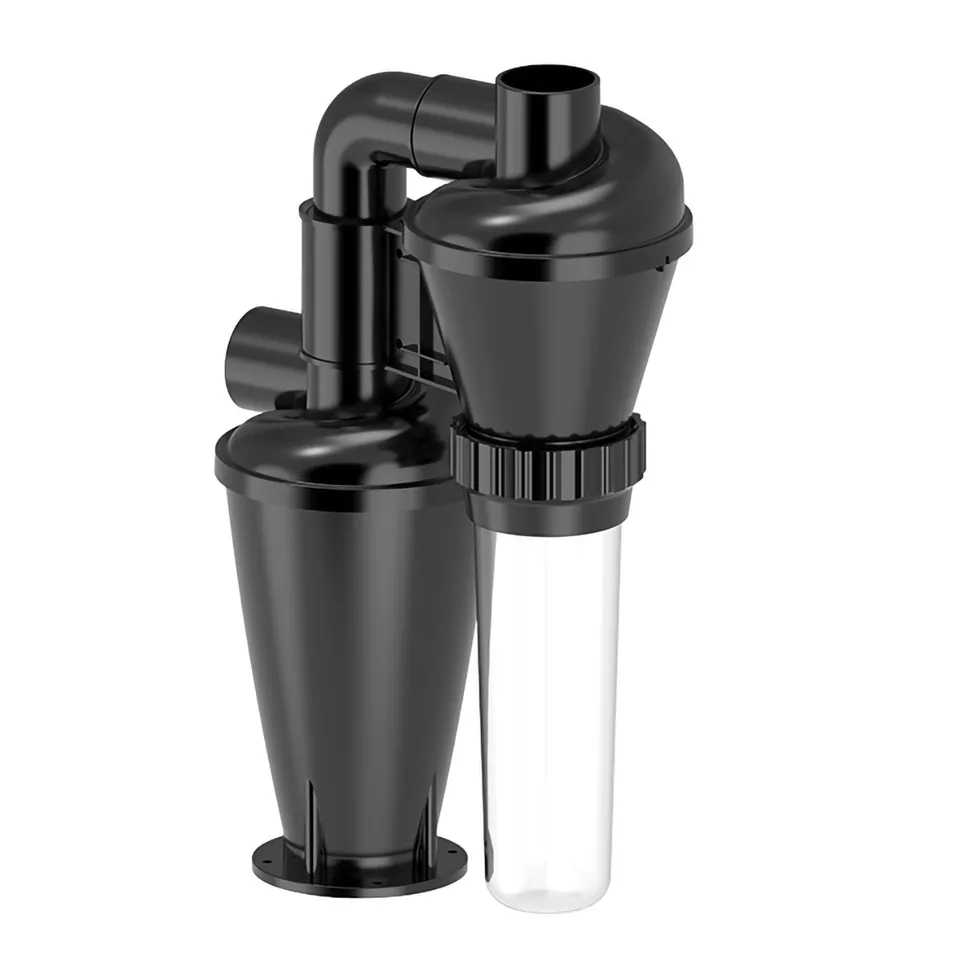
A true DIYer!
Though, sometimes you get lucky and despite it costing more… you end up with a better product, say worth £150 but also gained at least 50¥ in knowledge and entertainment/joy. A worthwhile investment. Sometimes.
Interesting. Do you design and 3d print them?
My latest obsession is sashiko, a Japanese form of embroidery with beautiful repeating geometric patterns. It’s a folk art that evolved to strengthen cloth, extend its lifespan, and repair torn clothes. Rather uniquely it’s also intended to be stitched with the fabric in your hands rather than in a hoop.
One thing I really love about it from a technical sewing standpoint is that traditionally you don’t use knots at all, but it’s still a strong stitch. Quilters do something similar with what’s called a waste knot that gets snipped away, but this skips the knot step entirely.
There are specific paths you follow while stitching these patterns so that you don’t waste thread. They vary in complexity from simple lines, triangles, and curves, all the way up to tiny repeating patterns that practically replace the cloth with thread.
I don’t have nearly enough patience to do the complex ones like that, but the more simple stitches are so relaxing.
I’m so looking this up. I love crafty stuff but it’s ages since I’ve done anything.
Info dump incoming:
It does require a bit of speciality equipment compared to regular embroidery, I thought I could get away without the sashiko thimble but it kills your fingers after a while. It’s a ring that you wear at the base of your middle finger with sort of a shield that the needle is braced on. Sashiko needles are longer and thicker than a typical sewing needle as well, because sashiko thread is fairly thick. You can get away with substituting sashiko thread with size 8 perle thread or something similar in size if you can’t find sashiko thread locally. But I like using the sashiko thread because it’s wound so that you can make a single cut in the skein through all the threads, and then they’re all a good size for stitching! It’s super convenient, just yank and go.
I definitely recommend watching some people on YouTube do it, it’s very different from what I think of as a typical embroidery technique. You sort of pleat the fabric onto the needle and then pull the needle through when you can’t really fit more fabric on the needle. I found this video pretty useful when I was figuring everything out.
There are also a lot of cloth kits with preprinted designs that wash out after you’re done. There are a few good companies but Olympus seems to be the most popular. Coaster kits or hana-fukin/handkerchief kits are great to dip your toes in.
If you try it out I hope you enjoy it!
But the specialized equipment can be obtained for less than $20 and then you’re set for a while! I love sashiko, for all the reasons you listed. I have a pair of project jeans, but now I’ve mended all the holes in my clothes and need to make more I guess.
This is the first hobby in here I’ve come across that I haven’t tried. Looks really neat! Along the same lines of Japanese repair arts, have you tried kintsugi? It’s really really rewarding as well.
I’ve seen kintsugi videos before, it’s very beautiful! I haven’t tried my hand at it, but if I had any broken ceramics I’d love to try it.
My hobbies mostly sit at the intersection of plants and electronics/programming esp. microcontrollers and managing fleets of them.
Im obsessed with making things grow and relatively simple types of automation can make a huge difference to a plant. A trickle of water applied at the right frequency can turn an unforgiving sun-scorched balcony into a garden.
Im currently working on prototypes of a device destined for mass production. It’s a power unit for a temporary immersion bioreactor used in plant tissue culture. The benefit of my approach is that the power unit can work with almost any growing container and the unit doesn’t need any power hookups.
The unit is powered by the plant grow lights and my Mark I prototype proved it can harvest enough energy to perform any published temporary immersion protocol I have seen.
I think this qualifies as ‘weird’ because it usually requires explanation to justify the ‘why’ of this project. Plant tissue culture is not a common interest.
But if you want to plant a trillion trees and ‘save the planet’, we will need to develop some new propagation methods. This is my little attempt to address some of that need.
What’s your favourite plant?
Right now it’s Boquila trifoliolata, a plant involved in a recent scientific publication that gets some attention for making a very bold claim. Can plants ‘see’?
This study below describes an experiment that seems to suggest they can. Who knows what the real answer will be, but this is science at it’s purest. You can scoff at the author’s conclusions but you cannot ignore their baffling observations.
I expected something like “yukka” or “rubber plant” not “alien plant with eyes”.
Thank you for the article though!
After going through the paper, it’s not just “alien plant with eyes”, but rather “alien mimic plant with eyes”! This plant “sees” other plants around (above?) itself and changes the shape of its own leaves to match those of the other plant.
I wonder if the effect can be chained, and if so, how long the chain could be? I’m imagining an alien mimic plant with eyes mimicking an alien mimic plant with eyes mimicking an alien mimic plant with eyes mimicking the first alien mimic plant with eyes.
That’s an amazing idea. Using excess energy from plant lights? Ingenious! Have you found any issues with the system that you are in the process of fixing?
Well the energy recovered from plant lights is actually really pathetic when using standard panels. Had to switch to amorphous panels which capture just enough energy to keep the battery sustainably charged day after day under typical loads.
Overall, the system reclaims just enough energy to run the air pumps for up to about 15 minutes total daily use. That’s plenty to achieve the goal of giving the plants a short soak in the nutrient medium which just drains away when the pump stops. It also facilitates filtered fresh air exchange and aeration of the liquid medium which is vital.
The next stage will be to make the system more thrifty with power (MOSFETs instead of relays and other tweaks to reduce current leakage when the microcontroller is asleep).
I want to add the ability to inject CO2 and monitor levels before I consider the product full-featured. Recent studies are showing that can result in huge gains in growth rates. Based on my estimates, a 16g CO2 cartridge (think paintball or whipped cream) can keep a typical 3-liter culture vessel at 4000ppm (10x over atmosphere) for a year, even if you completely flush with fresh air twice daily.
Thank you for your question and interest in my latest obsession.
-
Audio engineering. How to take a bunch of tracks that sound like hot shit and make them into beautiful music. How to record an awesome performance, probably in a shit space with shit acoustics and shit gear. How to work my “magic” on a track to somehow do the impossible. More recently, how to analyze and design analog outboard gear and digital plugins that emulate them in real time. I would do it for free if I had the time. I used to mix people’s tracks on Reddit (different username) before I went back to school.
-
Music, particularly writing and playing
shitty bedroom black metalguitar. So I guess not that weird other than the music choice… -
Automation, particularly AI and Control Theory. I approach AI from a dynamic viewpoint, i.e. using machine learning to analyze and control systems that “move”. I’m still working on unpacking the mathematical fundamentals of AI, especially because the dynamic applications I’m interested in require much more careful understanding of the assumptions that typical machine learning paradigms make about the input and output signals.
-
Math. Calculus, linear algebra, dynamical systems, and high- or infinite-dimensional problems. Both theory and applications. I read textbooks and watch open course lectures. I use this math to back up my intuition in all the above subjects. Even people who say they like math find my interest in the subject obsessive.
What the hell would constitute an “infinite dimensional problem”?
Any time you need to analyze or synthesize a function or signal, rather than just a set finite set of values, the problem will in general be infinite-dimensional unless you choose to approximate it. Practically, most physics problems begin as a partial differential equation, i.e. the solution is a signal depending on both time and space. Hopefully, you can use problem symmetry and extra information to reduce the dimensionality of the problem, but sometimes you can’t, or you can use the inherent structure of infinite-dimensional spaces to get exact results or better approximations.
Even if you can get the problem down to one dependent variable, a function technically needs an infinite number of parameters to be fully specified. You’re in luck if your function has a simple rule like f(t) = sin(t), but you might not have access to the full rule that generated the function, or it might be too complicated to work with.
Let’s say that you have a 3-dimensional vector in space; for example, v = (1,0,-1) (relative to some coordinate system; take a Euclidean basis for concreteness). Another way to represent that information is with the following function f(n) = {1 for n=1, 0 for n=2, -1 for n=3}. You can extend this representation for (countably) infinite vectors, i.e. sequences of numbers, by allowing n in f(n) to be any integer. For example, f(n) = n can be thought of as the vector (…,-2,-1,0,1,2,…). This representation also works when you allow n to be any real number. For example, f(n) = cos(n) and g(n) = e^n can be thought of as a gigantic vector, because af(n)+bg(n) is still a “gigantic vector” and functions like that satisfy the other properties needed to treat them like gigantic vectors.
This allows us to bring geometric concepts from space and apply them to functions. For example, we can typically define a metric to measure the distance between two functions. We can typically define a “norm” to talk about the size or energy of a signal. With a little bit of extra machinery (dot product), I can find the cosine between (real) functions and get the “angle” between them in function space. I can project a function onto another function, or a subspace of functions, using linear algebra extended to function spaces. This is how I would actually take that infinite-dimensional problem and approximate it: by projecting it onto a suitable finite basis of vectors and solving it in the approximation space.
Math can be so much fun. I fell in love with math after watching the linear algebra series by ThreeBlueOneBrown. Unfortunately I don’t have much time to do math puzzles, because I’m too busy with programming puzzles, hacking puzzles, arduino stuff or building stuff inside or outside the house.
I highly recommend checking out The Bright Side of Mathematics if you want to learn more about math in some detail. His videos are a lot shorter than typical open course lectures covering the same material, but you still get the major results and important proofs. He has playlists on linear algebra, real analysis, probability, and tons of more technical topics. IMO if I need to learn high-level math in a short time, he’s where I go first.
Also, despite the channel name, he has both bright and dark versions of all his videos so my eyeballs don’t melt.
3Blue1Brown is great too.
-
Grafting. I like grafting different varieties of fruit trees together to make trees that bear multiple varieties of fruit. So far I’ve grafted a golden delicious apple onto my crabapple, and a golden orb plum onto my purple plum. It’s pretty hit or miss, but cool when the grafts take. I’m going to try grafting some different varieties of stone fruit onto a wild peach tree that I have to see what will happen.
I also like growing fruit trees from seed. I have an avocado tree, an egg fruit tree, a mango, a few red plums, and a firepit peach tree. I also grew some pineapple plants from pineapples that I got from the store, and I got a pineapple from one last year!
Do you do it for the art or the food? I’d assume it is a bit of both, but I’ve never heard of a hobby like it. Any favorite combos?
I’m not sure why I enjoy it to be honest, other than I just think it’s neat to do. I just think the idea of a tree with plums, peaches, nectarines, and cherries all growing from it to be really cool.
I think my favorite is stone fruit so far, since they’re fairly different from each other. But it’s the one I’ve had the least luck with so far, too. Hoping it goes well this year!
I’d like to see some photos if you have them. At the moment I can only visualize what you mean, but it is really interest nonetheless.
Sure, here you go. This is where I grafted a yellow orb plum scion (branch) onto my purple plum tree. This is called a bark graft, usually used to graft another variety onto a tree that’s getting a little old (like old apple trees). You cut off a large section of the trunk or a branch, then you use a knife to lift up the bark, and you take the end of the scion (with the bark removed from it) and stick it in there. Then you secure with grafting tape. The cambium layers of the scion and tree heal together, and the tree passes nutrients into the scion which grows into a new branch.
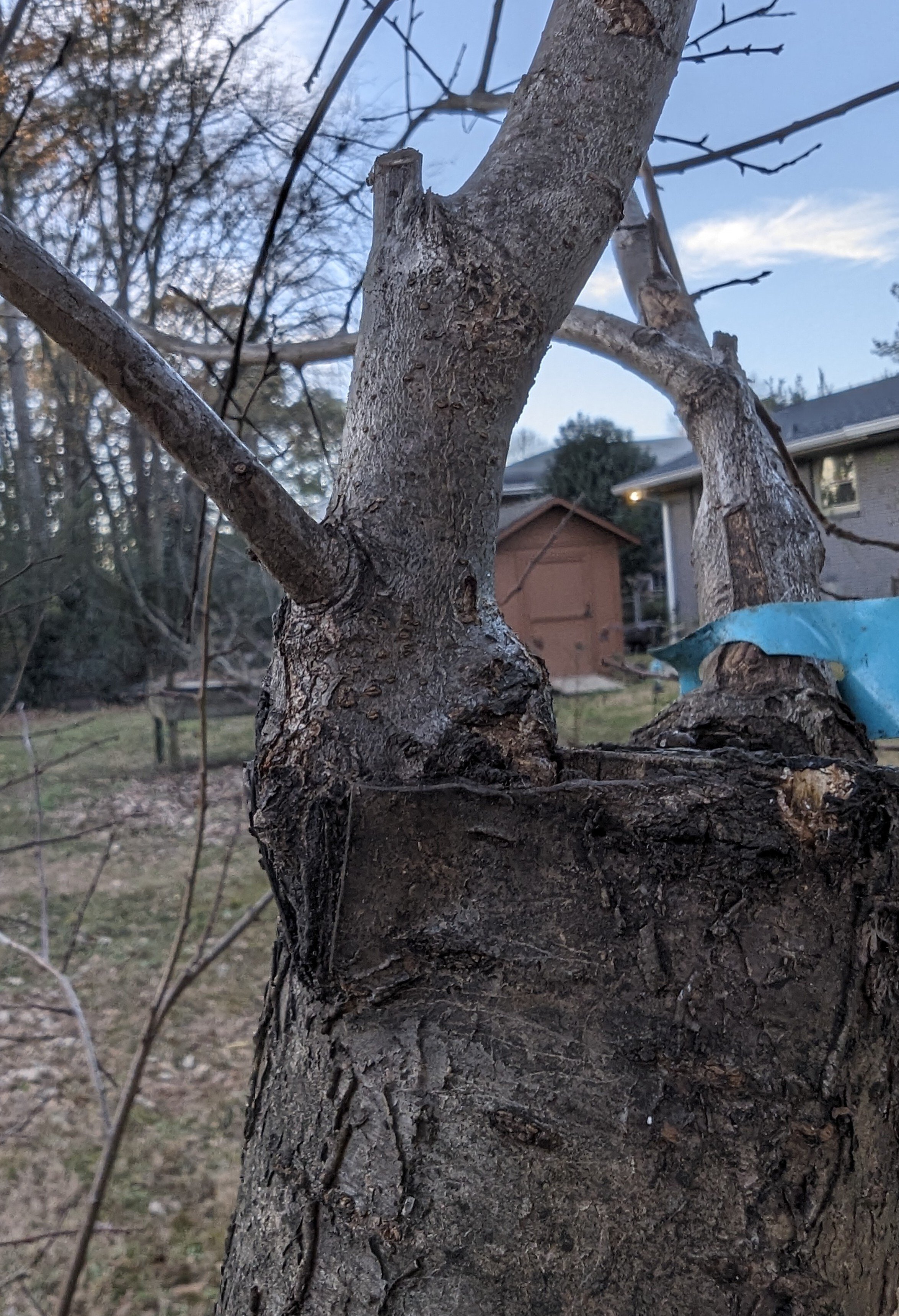
I read that as “Grifting” at first and I was like, yeah that’s a weird hobby…
😂
I heard you can graft a pear on a chokeberry.
I just looked that up and yep, looks like it works! I know pear can graft onto apple and vice versa, but the grafts don’t last.
How does that work exactly, like for someone looking to get started?
Here is an excellent article on grafting:
https://content.ces.ncsu.edu/grafting-and-budding-nursery-crop-plants
There’s also YouTube videos showing the various procedures.
I would start with bud grafting, since it’s one of the easiest to do. You could get yourself some root stock and bud graft a few varieties onto it and see what happens.
Hit me with your top flashlight fact.
The first flash lights could only light up for a moment at a time, creating a flash… hence the name
I didn’t know this. I’ll have to remember it for future small talk!
Honestly, I just made that up… but then I looked it up and its basically true.
I am not disappointed in the slightest.
There is more to flashlights than brightness. Color (color temp), ability to render the colors of objects (color rendering index [CRI]), and intensity (Candela) are some of the most common measurements.
There are also things like how tight you want your beam and the type of optic you want. Do you want a reflector or TRI optic? There are so many little things that go into the perfect flashlight for each individual.
Is there an ultra niche market for flashlight customization, or is it mostly enthusiasts DIYing their own setups?
There is! Check out intl-outdoor.com for a very wide variety of flashlight bodies and a large range of emitters. I have never DIYed my own flashlights however I plan on changing that in thr future.
Hi there! Looks like you linked to a Lemmy community using a URL instead of its name, which doesn’t work well for people on different instances. Try fixing it like this: !flashlight@lemmy.world
Of course! I was actually on there right before I found this community. Before the reddit exodus, I was an avid member of r/flashlight. I have over $500 of flashlights and annoy the crap out of my friends with the age old “have you seen my new flashlight?”
I love radio control trucks, but not for competition or to go fast. I like taking them for a walk like one might walk a dog … it’s just fun and a bit silly.
I get walking them. Sometimes it is just fun to watch things like that work.
I’ve been out of it for a while now, but I spent a number of years Nerfsmithing. Which is to say, I modified Nerf blasters. I upgraded the internals to get longer range and higher rates of fire. My real fun, though, was modifying the exteriors to see just how silly I could get. I made a lot of different designs, but below is my masterpiece.
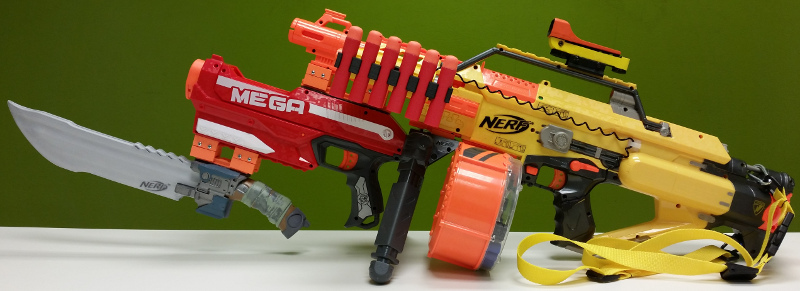
I attached a real red dot sight, after carefully painting it to look like a Nerf accessory. I attached a real laser sight and tactical light, after mounting them inside the case of what had been an official Nerf light. The 10-round straight magazine was replaced with a 35-round drum magazine. A rifle strap (in bright yellow) and a Nerf bipod finished off the main unit (a Nerf Stampede).
Then I attached a Nerf Magnus pistol, still fully functional, as a front grip. And I attached a Nerf Zombie Strike Machete under that as a bayonet.
It looks overbuilt and ridiculous, which is what I was trying for, but it was also an absolute terror in the office Nerf wars. I had a lot of fun building it.
Leather working. I inherited my grandfather’s old hatchet and knife from when he was a boy scout, these 80+ year old relics had their original leather sheathes that were totally disintegrating and stiff. After looking fruitlessly for replacement sheathes I decided it couldn’t be that hard to make my own, and now I’m hooked. I have leather cases for all of my devices, leather bags for different traveling needs, and leather wallets and trinkets make the absolute best gifts. People are always blown away by hand made leather products.
Got any pics? That sounds cool!
I second this request
Increasingly, mini painting has been eating my life. I tried to fight off 40k obsession but it’s been slowly pulling me in for a while now. But probably the weirder part is, I haven’t actually played the game yet. Still trying to get everything tabletop ready.
When I ready mini painting I though you were talking about doing normal paintings on tiny canvases. 😅
Was into mini painting for a while when my partner and his friends still used to play BattleTech. I did play a bit myself but painting was much more exciting. :D I’d love to get back to it - always looking enviously at the Warhammer displays in our games store.
Do it! The characters make great display pieces even if they’re not being used for anything. You can also try looking into 3d printed stuff, which is much cheaper, if you don’t care about it being tournament legal or anything.
Speaking of 3d printing, have the minis ever made you interested in potentially getting into 3d printing?
Yep, it’s quite tempting. There are a lot of mini companies that sell .stl files so that you could make proxies for Warhammer armies or just make tons of cool display pieces. Small studios can even publish whole game systems online with just .stl and .pdf files.
The problem is just finding people to play them…
There’s a Basketball community, though it’s small. We’d love to have you!
deleted by creator
Fair enough, here’s the Deff Dread I spent like 4 weeks building and painting!
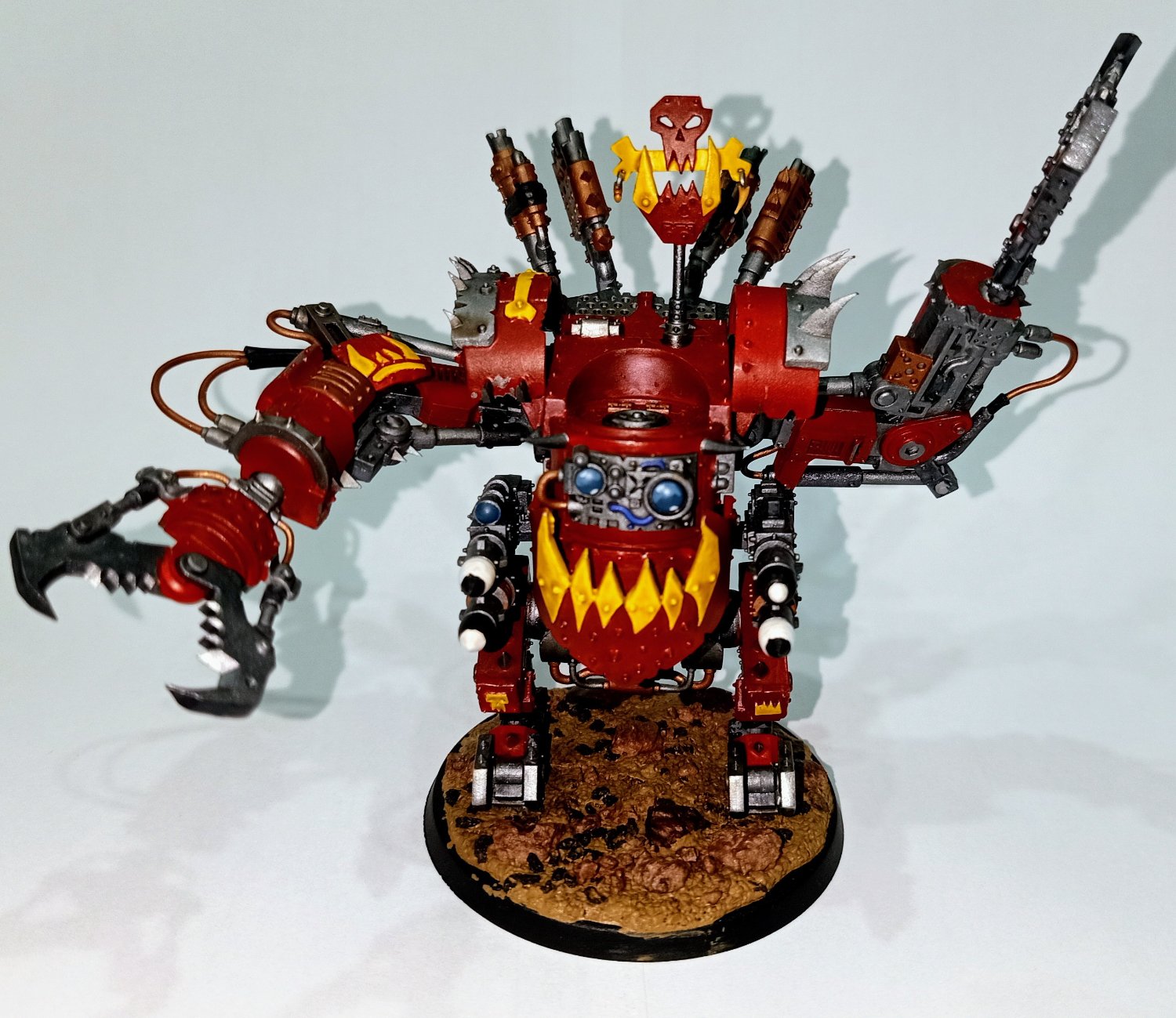
Okay, that is just cool.
Thanks!
Flashlights are an interesting one. I somehow ended up in !flashlight@lemmy.world and it’s definitely a unique hobby. I’m not sure if I’m willing to really join all of you yet, but reading the posts can be pretty cool.
For me, it’s probably CRTs, other display technologies and old hardware in general. It’s fun to tinker around with stuff. And playing games, be it new or old, on CRTs is what I live for.
I highly suggest a Convoy or Sofirn flashlight if you ever get into flashlights. Both are very reliable for an extremely reasonable price.
As for CRTs, are there any advantages to CRT over other display types? Is it a personal preference?
Haha thanks for your suggestions, I’ll look into it :)
And with CRTs, yeah, they can be pretty good. Of course, a calibrated CRT has perfect black levels, but that’s not even the best part. OLED and Plasma can do that too, after all. What I love about CRTs is the motion clarity. During motion, every display except CRTs becomes blurry. That’s the most important part for me. It makes a night and day difference for games.
I made a post about a high end CRT monitor here. This monitor can go up to 1440p or up to 160hz (not both at the same time, though). I love it.
And of course, a standard definition CRT is awesome for any pre HD console. They look awesome.
So yeah, I think we definitely lost something with the transition to LCD and OLED. I hope I didn’t get into to much detail here, once I start with talking about the greatness of CRTs, it’s hard to stop :)
My weird hobby is reading textbooks on forensic medicine and other forensic sciences. Like how to perform an autopsy, how to identify the cause of death, how to take and interpret fingerprints from different surfaces and such. I am a trained toxicologist but unfortunately only had basic training in forensic toxicology as part of my curriculum (and not working in that field now). 🙂
That is actually really interesting. Would you ever consider going into the field or will you remain all hobby? I’m studying basic forensics in my criminal law pathway in High-school but it is VERY surface level.
I’d love to but would need a lot more training to do so. Which I fear I won’t get due to time and financial constraints - you know, being the bread winner of the family, full time job, a child… But on the other hand, I do love my current job and it earns me the money to buy all the expensive text books, so I won’t complain. :D
What do you do at your current job if you don’t mind me asking?
After spending a bit more than a decade in academic research, I am now a regulatory toxicologist in biocides assessment at a national authority. Sounds boring but comes with much work in international committees which is fun (and oftentimes restores my faith in humanity) and we do some research and teaching, too. Plus, it is a nice job in terms of doing something for society, making the world a safer place… 🙂















